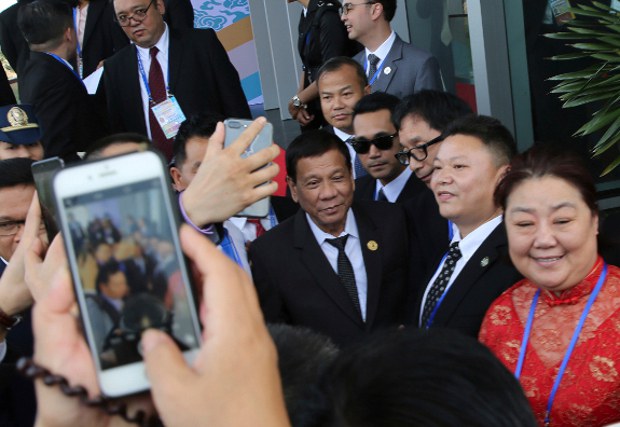Philippines: Duterte Proposes World Summit on Human Rights
2017.11.10
Manila
 Philippine President Rodrigo Duterte, center, poses for a photo as he leaves the Asia-Pacific Economic Cooperation (APEC) CEO Summit in Danang, Vietnam, Nov. 9, 2017.
Philippine President Rodrigo Duterte, center, poses for a photo as he leaves the Asia-Pacific Economic Cooperation (APEC) CEO Summit in Danang, Vietnam, Nov. 9, 2017.
Philippine President Rodrigo Duterte said he was willing to host a human rights “world summit” to defend his administration's bloody war on drugs, which has left thousands dead since he assumed power last year.
Facing international condemnation from rights bodies, the European Union and the United Nations, Duterte brought up the idea while attending the Asia Pacific Economic Cooperation meeting in Vietnam.
“We should have a summit only on human rights. But we should call all,” Duterte said, according to an official transcript of a news conference after meeting the Filipino community in Vietnam on Thursday night.
“So let’s have a summit of how we can protect the human rights for all human race,” Duterte said. “Let us investigate all violations of human rights committed by all governments.”
At least 3,800 alleged drug users and dealers have been killed since Duterte assumed power last year, according to the police.
But the Philippine Alliance of Human Rights Advocates said the actual count was at least 12,000, including many who were killed by unknown vigilantes who leave cardboard messages owning up to the murders.
The crackdown has not spared children, including three teenagers who were among about 100 suspects slain in a series of anti-drug raids in August.
Powerful leaders of the Catholic Church and other critics have condemned the killings.
A Christian evangelical group who had campaigned for Duterte last year also recently cut its ties with the president and called for greater accountability.
Duterte, during the meeting with Filipinos in Vietnam on Thursday, also claimed that, at age 16, he had killed a person.
It was not immediately clear whether the president was serious. He has often made outrageous claims that his spokesmen have had to walk back.
Duterte had variously said in the past that he had killed “about three people” and that he shot a person when he was a law student in San Beda University, a private college in Manila. But it was the first time Duterte claimed to having knifed someone to death when he was a boy.
In an invective-laced speech to the Filipino community earlier, Duterte spoke about his drugs war and blasted critics.
He also doubled down in delivering personal anecdotes, accentuated with gutter language, a strategy that has endeared the politician to ordinary Filipinos who were craving for change.
On Thursday, Duterte claimed that when he was 16, he had stabbed to death a man who just happened to stare at him, and that he was already in and out of jail.
“I stabbed him because he stared at me, how more now that I am president?” Duterte told the crowd, who wildly cheered.
Trying to recover from a potentially embarrassing official admission, the presidential palace said that Duterte was just fond of using "colorful language" when addressing Filipino audiences overseas.
Duterte also focused again on United Nations human rights rapporteur Agnes Callamard, whom he had earlier blocked from conducting an investigation into the killings.
He said he had told Callamard: “I will slap you in the face if you investigate me.”
“Do not give me that shit! This rapporteur, I will slap her in front of you. Why? Because you are insulting me!” Duterte said, emphasizing that he had dared the United Nations to file a case against him at the International Criminal Court, an international tribunal that sits in The Hague.
Duterte pointed out that Callamard had not commented on victims of violence in the Middle East, and asked, “Why are you so fascinated with drugs?”
Trump warned
In the news conference, Duterte also threatened to ban U.S. Reps. James McGovern (D-Mass.) and Randy Hultgren (R-Ill.) from visiting Manila after the lawmakers asked Donald Trump to raise the issue of human rights during his bilateral meeting with the Philippine leader in Manila on Monday.
”If you do not like me, I do not like you. We're even," Duterte said.
His spokesman, Harry Roque, said earlier that Manila could not dignify the American politicians’ own point of view, reiterating that Manila’s adherence to rule of law and protection of human rights was “firm as ever.”
“The government is investigating allegations of so-called extra-judicial killings, including homicide cases with drug-related motives. Ongoing investigations include the conduct of public congressional hearings,” Roque said.
“All these are undertaken precisely to ensure that due process and the rule of law prevails despite the Philippines’ significant drug problem,” he said.







